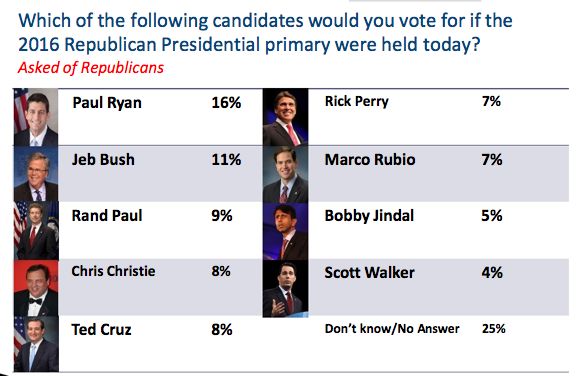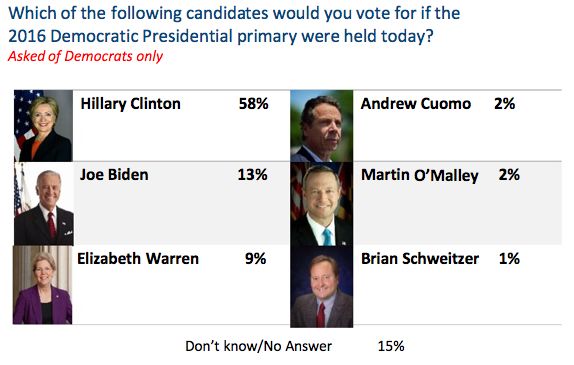The Next President Can't Win Without the Youth Vote in 2016

Millennials: The Politically Unclaimed Generation, a report released in July by Reason-Rupe, a Libertarian public policy think-tank, found that “a majority of millennials, 53 percent, would support a candidate who described him or herself as socially liberal and economically conservative.”
Only 48 percent of young adults between the ages of 18-29 voted for Al Gore in 2000, whereas 66 percent of youth voters supported Barack Obama in the 2008 election and 60 percent supported him in 2012. It is also clear in their overwhelming support for liberal policies -- such as legalizing marijuana (57%) and same-sex marriage (67%) -- that the young electorate has changed.
So what could this mean for the next crop of presidential candidates?
According to Fusion’s Massive Millennial Poll, Millennials support Hillary Clinton and Paul Ryan for their respective parties in the upcoming 2016 presidential election. It is the most recent poll to examine Millennial attitudes on the 2016 election.
It’s worth noting that the Fusion poll only asked Democrats about Democratic candidates and Republicans about Republican candidates. The Reason-Rupe poll revealed that 34 percent of Millennials called themselves independents -- over triple the rate among Americans over 30.
Millennials care about Debt/Economy and Health Care the most
The Fusion poll also asked respondents what they thought the most important issue facing America was, in contrast to the Reason-Rupe poll, which asked them what the most important issue was for them. Interestingly enough, the small difference in wording led to a completely different set of top answers. The only issues that cracked the top-five for both polls were health care and debt/spending.
Millennials’ strong concern over debt and spending certainly makes sense given that many of them graduated college during the Great Recession, and they will be the generation that will have to deal with the United States’ massive debt.
Millennials face a 14.5 percent unemployment rate, which is above the national average of 11.5 percent. Likewise, the median income rate has dropped by $2,300 in the past three years. Sixty percent of respondents to the Fusion poll indicated that they were currently in debt.
In fact, Millennials are the most indebted young generation in the history of the U.S., as the average member of the class of 2014 graduated with $33,000 in student loans.
Which 2016 hopeful could win over Millennials?
One of the few big advantages Warren has over Clinton is her hardline stance on student loan reform. Many independents, Democrats, and liberals view Warren as the leader on this issue, as she has fought tirelessly in the Senate to fix the student loan system. This will surely appeal to Millennials if Warren should decide to run.
Clinton’s2008 economic platform, which was pro-stimulus and government spending, emphasized revitalizing the economy, and included balancing the budget and tax cuts for low-and-middle-income families, will surely appeal to Democratic Millennials. The real question is just how far Warren’s ‘populist’ stance on economic inequality and against banks will push Clinton to the left in the Democratic primary, and whether her liberal policies could ultimately grant her the nomination over Clinton, who will push more centrist economic policies.
Ryan, the long-time chair of the Congressional Budget Committee, touts his ability to pass a bipartisan budget on his platform page, but has down played the role of such budgets in the 2013 government shutdown.
Ryan’s efforts to repeal Obamacare will undoubtedly also be a disservice to his ability to garner Millennial votes, as a majority of them supported it, according to the Fusion poll. Their concern over the future of health care most likely derives from the impending medicare deficit, as well as in the flaws of Obamacare and the GOP’s constant efforts to repeal it.
Millennials were surely thrilled to stay on their parents' health insurance plans until age 26, and must fear that the extra cushion will be repealed if the Republicans have their way.What's in store for 2016?
It is hard to paint a vivid picture of the race this early, as the majority of the presidential field has yet to be revealed. These polls are sure to evolve closer to 2016.
Elizabeth Warren might not run -- she is insistent that she will not -- although, firm support from voters across the United States might change her mind. There is still plenty of time for a surprise candidate (or two) to enter the race (Obama was still a long-shot at this time in 2007).
The only definitive conclusion about the 2016 race is that whoever wins is going to need serious support from Millennials, who helped ensure an Obama victory in 2012. Youth voters were key in important battleground states, such as Florida, Pennsylvania, Ohio, and Virginia; had Romney gotten even half of youth votes in those states, he would be president today.
So, if Clinton or Ryan (or Warren) seriously want to secure their chances of being nominated, they might want to seriously consider including Millennials’ interests in their platforms.
Photo: Jon Dickson / TheClause.org






